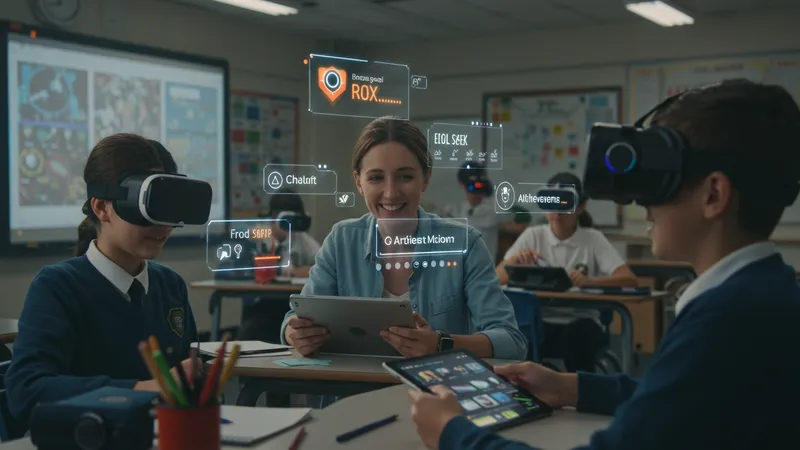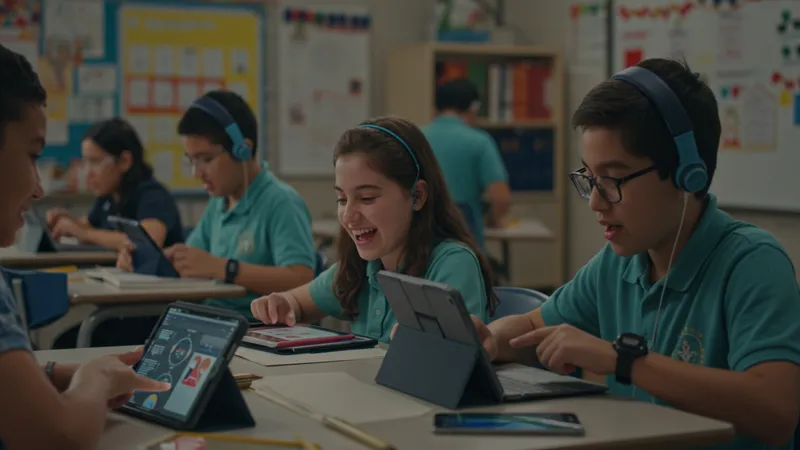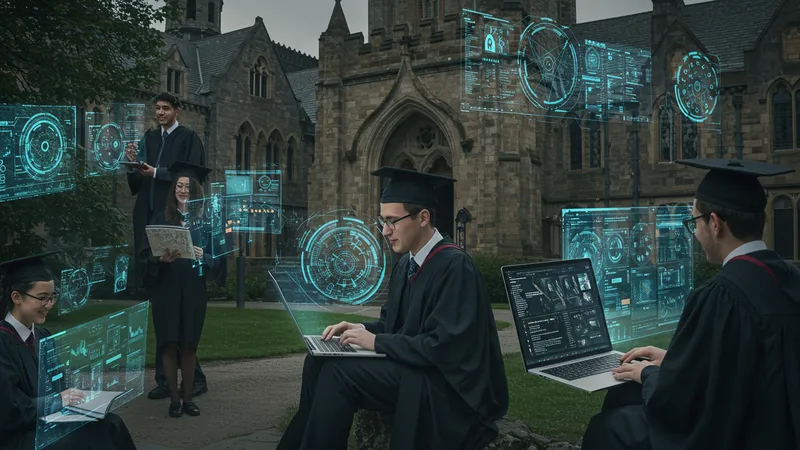
Did you know that online education is not just an alternative, but a transformative power reshaping the entire educational landscape worldwide? That’s right — this silent revolution is affecting classrooms across all continents.
In today’s rapidly digitalizing world, the significance of online learning has surged beyond convenience; it's now a crucial part of how we acquire knowledge and skills in 2023. Buckle up for some revelations that might just surprise you.

It turns out that online education isn’t merely a digital reproduction of traditional classrooms; it encapsulates innovative methodologies that challenge our very understanding of learning. Platforms like Udacity and edX collaboratively work with industry experts to tailor courses for market relevance, significantly boosting employability. But that's not even the wildest part…
Shockingly, research indicates that students enrolled in well-structured online courses outperform their in-class counterparts, due to the personalized pacing and diverse resources available at their fingertips. Imagine having Harvard-level courses accessible from your bedroom, at your pace. We’re on the cusp of witnessing a major societal shift. But wait until you hear what educators have to say next…
What happens next shocked even the experts: some educators are claiming that online learning will soon not just supplement, but replace traditional education systems entirely. Are we really ready for such a seismic shift in how we perceive learning? Keep reading to discover the surprising twists that experts are just now beginning to acknowledge.
Online education is not just about learning from the comforts of home; it’s reshaping student engagement and educational accessibility. Students no longer face geographical and financial barriers that traditional education imposed. But surprisingly, it’s not only about convenience...

What’s truly driving this wave of acceptance is the undeniable cost-effectiveness and flexibility that online courses offer. Institutions are spending less on physical infrastructure, and students are saving on commuting and accommodation, translating into lower tuition fees. It's a win-win that only a few foresaw...
Moreover, the shift to online has introduced a more interactive and engaging learning ecosystem. Real-time quizzes, virtual labs, and global discussion forums have made the learning experience more dynamic. This isn’t the chalkboards you remember from school...
But here’s the twist: Many educators argue that the social skills fostered in a physical setting face challenges online — yet, solutions like virtual reality classrooms are brewing to address this. What you read next might change how you see digital education forever.
Did you know that companies actively seek candidates who have completed online courses for specific skills? In a strange turn, what was once considered inferior to a college degree is now sometimes seen as more practical by employers. And there's more...

The industry-specific courses available online provide highly targeted and updated content that traditional universities often lag in offering. Online platforms partner with industry leaders to ensure they maintain cutting-edge content, making their courses invaluable...
As a result, employees are able to upskill and reskill far more frequently, aligning themselves with ever-evolving market needs. Rather than spending years on a degree, professionals can now acquire essential skills in a matter of months...
But there's one more twist: The credential issue is evolving fast, with digital badges and certificates gaining strong acceptance among major employers. What follows might redefine educational achievement in unprecedented ways.
Surprisingly, online education isn't limited to academic achievements. Many students report significant personal growth, including improved self-discipline and stronger time management skills. This transformation is far-reaching...

The autonomy inherent in digital learning requires students to manage their schedules and set goals independently, imbuing them with skills applicable well beyond education. It's a self-taught lesson in adulting that traditional education can’t replicate as effectively...
Furthermore, interactions with peers across the globe foster a global mindset, broadening perspectives and nurturing cultural awareness. It's an invisible curriculum working alongside digital syllabi...
However, what experts recently unearthed is even more impactful: these interactions help combat the isolation often associated with online learning. And what's coming up next isn't just ingenious, but potentially game-changing for online community building.
Yet, with all its perks, online education is not without challenges. The lack of physical interaction can foster feelings of isolation among students, leading to issues with motivation. That’s just one part of the problem...

Access to technology remains an obstacle for many, exacerbating educational inequalities instead of decreasing them. Institutions and policymakers are, however, tackling these issues head-on, leaving no stone unturned...
The digital divide has drawn initiatives to provide better access and infrastructure. Governments and NGOs are moving mountains to ensure everyone benefits from this educational wave, but is it enough?...
There’s more: cybersecurity threats have been a rising concern, with breaches increasing. Find out how institutions are locking down their digital learning environments in what’s unveiled next, a part of the discussion that’s often left in the dark.
With the rise of online education, safeguarding data and personal information has become a pressing issue. Breaches can occur, and they often do when least expected. There's more lurking beneath the surface...

Educational institutions are now partnering with top cybersecurity firms to develop robust systems that protect students' data. But more compelling is the investment in student awareness programs about security best practices...
This new focus on cybersecurity education empowers students not just academically, but they emerge more tech-savvy and conscious of their digital footprints. The implications extend far beyond online learning...
But what’s really intriguing is the tech advancements in real-time threat monitoring, using AI tools to predict and neutralize threats before they manifest. This might be the peace of mind online education undergraduates and their institutions need.
Imagine playing games as a part of your learning process. Surprising? With gamification techniques, this is now a reality, adding a much-needed fun factor to lessons and keeping students engaged for longer stretches...

While education was once strictly about books and notes, gamification introduces rewards systems, challenges, and even shared missions; learners are finding themselves more motivated than ever...
The competition between students shifts from grades to gaming scores, yet surprisingly, it cultivates collaboration and problem-solving skills. But there’s an unexpected downside too...
While the enthusiasm is high, overdependence on gamification might distract from core educational outcomes. Educators are navigating this fine line, striving to balance engagement with tangible learning objectives. Discover the solutions they’re crafting next.
Never before has the education sector been so open to blending online and offline learning methods. This hybrid approach is crafting a new normal, offering flexibility while maintaining traditional advantages...

Through hybrid learning, students benefit from face-to-face interaction alongside digital resources, ensuring they don’t miss out on either vital component. The magic lies in its adaptability...
Teachers are finding innovative ways to leverage technology in the classroom, integrating live sessions with online content to enrich learning experiences. The method to this madness defies initial skepticism...
Hybrid learning encourages a shift in teaching strategies and learning methodologies, requiring educators to be proficient in multiple formats. What’s unveiled next is how some schools are excelling at this transition, setting precedents worldwide.
Online platforms are opening incredible opportunities for special needs education, offering tailored resources that cater precisely to individual requirements — a feat traditional settings struggle to achieve...

With personalized software, students receive instruction suited to their learning speed and style, promoting inclusivity without compromising quality. The transformation is quietly unfolding...
Specialized tools are being developed to support students with cognitive, physical, and emotional challenges, significantly enhancing their learning experiences. However, the push for inclusivity is ongoing...
The commitment to improving accessibility in online education promises broader acceptance and understanding of diverse educational needs. It might surprise you to learn what's in the pipeline for these services, defining new pathways in education.
The online education boom is revolutionizing language learning, breaking down barriers of entry that once made this endeavor challenging. This is a tale of transformation...

Through dynamic platforms, learning a foreign language has become more immersive and interactive than conventional methods allow. Students connect with native speakers globally without leaving home...
Engaging in real-life conversations using voice recognition software and interactive apps, students gain practical language skills that are proving more effective. The change is more than noticeable...
Yet, while the convenience is unparalleled, concerns about losing cultural nuances exist. What comes next as developers integrate cultural immersion features into language learning modalities is equally fascinating.
One of the alluring promises of online education is self-paced learning, allowing students to progress as they wish. However, it’s not all smooth sailing...

For some, the freedom works wonders, enabling contemplation and thorough understanding without the pressure of deadlines. Yet others struggle with self-discipline, which presents a substantial hurdle...
The lack of imposed schedules can lead to procrastination. This reveals a stark contrast in student outcomes and what needs rethinking in self-paced education...
Unprecedented strategies are being tested to instill accountability, with mentors and tracking systems aimed at nudging students towards completion. Next, find out how these innovations are redefining self-paced learning for better efficacy and equity.
Online degrees were once stigmatized; today, they’re challenging the ivory towers of traditional education. And yet, the journey isn’t straightforward...

Perceptions are shifting as increasingly prestigious universities offer online courses. Students are paying for the brand and prestige as much as the learning itself, intrigued by the prospect of a well-rounded yet accessible education...
Generations raised on digital tech are embracing online degrees more openly, treating them as a viable alternative rather than a fallback plan. Yet, resistance and skepticism remain within some professional circles...
These perceptions are slowly crumbling as employers adjust their recruitment strategies, recognizing skill over place of study. The next progression of online degrees is as promising as it is unpredictable, uncovering the bright future of digital diplomas.
Microcredentials are defining a new era in education, offering bite-sized qualifications for specific skills. Forget long years of study; this is learning in real-time...

The rising trend speaks to a workforce hungry for upskilling quickly and efficiently, directly addressing industry demands in a timespan classical degrees cannot compete with...
With digital badges gaining traction, credibility questions persist but are diminishing as prominent companies like Google spearhead these developments. But the controversy won’t lay flat...
This emerging scene of microcredentialing is daunting traditional education systems into reevaluating their approach towards employability. What’s laid ahead might herald a significant paradigm shift; it’s one twist you won’t want to miss.
The story of online education is robust, nuanced, and full of promises that extend far beyond the foreseeable future. As the global landscape evolves, so does the approach to learning...

From democratizing access to education to reshaping skill acquisition, the impact of digital learning is more profound than many expected. The detours and milestones ahead ensure this narrative stays compelling...
This educational revolution hinges not just on technology, but on adaptive minds eager to learn, evolve, and flourish. The question isn't what online education can do, but how far you're willing to take this journey...
So if you're ready to dive into the ocean of digital possibilities, bookmark this article, share it with friends who need a nudge, and brace for the next evolution in learning. The world is your classroom. Are you ready to embrace it?